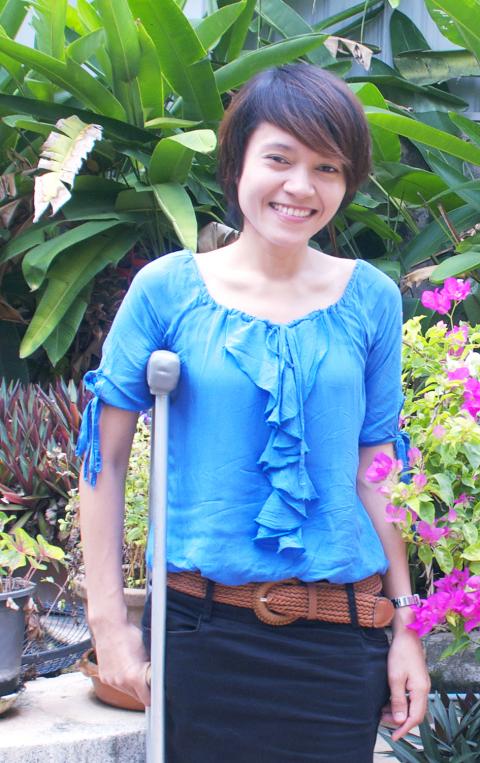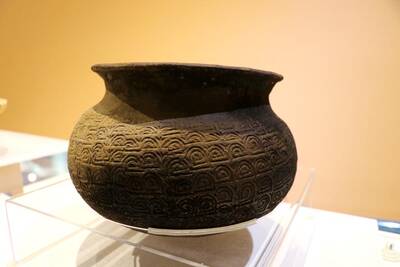When the Cambodian government banned Miss Landmine Cambodia, a beauty pageant planned for the summer of 2009, anti-land mine campaigner Song Kosal felt let down.
“It was a missed opportunity to raise the issue of land mine reform and encourage women and amputees not to remain silent, to not hide behind their fears,” Kosal told the Taipei Times by telephone from the office of the Cambodia Campaign to Ban Landmines & Cluster Munitions, where she works as a spokeswoman.
The activist will give a lecture tomorrow titled Global Citizen: What Can You Do to Help Eliminate Landmines Worldwide? as part of an event held by the Lung Yingtai Cultural Foundation (龍應台文化基金會) and the Eden Social Welfare Foundation (伊甸社會福利基金會), which is the local representative for the International Campaign to Ban Land Mines.

Photo Courtesy of Lung Yingtai Cultural Foundation
Kosal, 27, knows something about land mines and the disappointments of its survivors. While working in a rice field on the Thailand-Cambodia border, she stepped on one, which resulted in the amputation of her right leg. She was 6 years old.
“After I became disabled, a land mine survivor, I felt sad and disappointed with myself,” she said.
But Kosal overcame her disability and began campaigning on behalf of land mine survivors at the age of 12. She has since traveled the world as an international ambassador for the International Campaign to Ban Land Mines, calling on governments to sign the Mine Ban Treaty, the international agreement that prohibits the use of antipersonnel land mines. A total of 156 countries have done so since its inception in 1997.
Taiwan has been unable to sign the pact because it is not a UN member, said Chang Shin-hui (張心蕙), a specialist at the Eden Foundation’s International and Cross-Strait Affairs Center.
“That’s a challenge Taiwan faces in all treaties. We are in a very weird position. But that doesn’t mean that Taiwan cannot play an active role in the international community,” Chang said in a phone interview.
Chang said the government has passed legislation “in the spirit of the Mine Ban Treaty,” which calls for the complete removal of land mines in Taiwan by 2013. However, the legislation, known as the Landmine Regulation Act, falls short of the treaty’s total ban because it permits the stockpiling and the use of land mines in war, she said.
“The military refuses to disclose how many are stockpiled for the sake of national security,” Chang said.
Still, Chang said that the government will achieve its goal of removing all previously lain land mines, which were mostly deployed in Kinmen and Matsu during the 1950s.
“There is very good progress in terms of de-mining — already 45 percent on the offshore islands,” Chang said.
Though the number of buried land mines throughout the world is impossible to estimate, International Campaign to Ban Land Mines’ 2010 Landmine Monitor reported that 35 states not party to the Mine Ban Treaty have stockpiled more than 160,000,000 antipersonnel land mines. In 2007, the Landmine Monitor identified 473,000 land mine survivors worldwide.
Chang said Kosal is an ideal spokewoman to raise awareness about land mines because she’s young, dynamic and has firsthand experience as a land mine survivor.
“We have land mine survivors in Taiwan who are in their 60s and 70s and live in Kinmen and Matsu. But their stories are not heard,” Chang said.
In addition to tomorrow’s lecture, Kosal will attend the ROC Centennial Peace Day on Kinmen early next week with President Ma Ying-jeou (馬英九), where she’ll ring the Centennial Bell of Peace, which is made from artillery shells.
And the beauty pageant? Even though it was banned by the Cambodian government, voting still went ahead online. Kosal came in second place.

Sept. 1 to Sept. 7 In 1899, Kozaburo Hirai became the first documented Japanese to wed a Taiwanese under colonial rule. The soldier was partly motivated by the government’s policy of assimilating the Taiwanese population through intermarriage. While his friends and family disapproved and even mocked him, the marriage endured. By 1930, when his story appeared in Tales of Virtuous Deeds in Taiwan, Hirai had settled in his wife’s rural Changhua hometown, farming the land and integrating into local society. Similarly, Aiko Fujii, who married into the prominent Wufeng Lin Family (霧峰林家) in 1927, quickly learned Hoklo (commonly known as Taiwanese) and

The low voter turnout for the referendum on Aug. 23 shows that many Taiwanese are apathetic about nuclear energy, but there are long-term energy stakes involved that the public needs to grasp Taiwan faces an energy trilemma: soaring AI-driven demand, pressure to cut carbon and reliance on fragile fuel imports. But the nuclear referendum on Aug. 23 showed how little this registered with voters, many of whom neither see the long game nor grasp the stakes. Volunteer referendum worker Vivian Chen (陳薇安) put it bluntly: “I’ve seen many people asking what they’re voting for when they arrive to vote. They cast their vote without even doing any research.” Imagine Taiwanese voters invited to a poker table. The bet looked simple — yes or no — yet most never showed. More than two-thirds of those

In the run-up to the referendum on re-opening Pingtung County’s Ma-anshan Nuclear Power Plant last month, the media inundated us with explainers. A favorite factoid of the international media, endlessly recycled, was that Taiwan has no energy reserves for a blockade, thus necessitating re-opening the nuclear plants. As presented by the Chinese-language CommonWealth Magazine, it runs: “According to the US Department of Commerce International Trade Administration, 97.73 percent of Taiwan’s energy is imported, and estimates are that Taiwan has only 11 days of reserves available in the event of a blockade.” This factoid is not an outright lie — that

The People’s Republic of China (PRC) yesterday paraded its military hardware in an effort to impress its own population, intimidate its enemies and rewrite history. As always, this was paced by a blizzard of articles and commentaries in the media, a reminder that Beijing’s lies must be accompanied by a bodyguard of lies. A typical example is this piece by Zheng Wang (汪錚) of Seton Hall in the Diplomat. “In Taiwan, 2025 also marks 80 years since the island’s return to China at the end of the war — a historical milestone largely omitted in official commemorations.” The reason for its